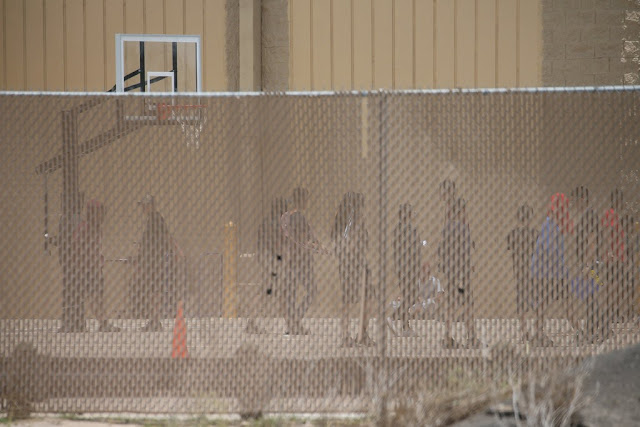"Met Dick Harding downtown." Okay then.
Borden's was a local chain of cafeterias in Tulsa. One of the founders had an excellent sense of humor. "“Through diligence, hard work and careful planning,” Leroy Borden would later say, “we lost money from the start.”
It's surreal to retrace these travels as the fam unit heads west, as this is basically I-40, along which I have traveled in both directions dozens of times. Shamrock. Prairies like an ocean. Seafood and beef on the hoof. Frozen. No trace of the New Western Motel, deluxe ranch style. Long gone.
The De Anza is another one of those Route 66 motels that ended up being considered historic, added to the National Register of Historic Places in 2004. Renovation finally began on the property in November, 2017, after many years of various attempts. The project is expected to cost at least $8 million.
La Placita is of course still there, still serving food. Still with the famous huge cottonwood tree in the middle of one of the rooms, as noted above. And, apparently, haunted.
Along with the typed notes from my grandfather, apparently it was my great aunt who hand wrote many notes as well.
Apparently my grandfather was offended by the residents of Gallup, whereas my great aunt, at least in Winslow, was thrilled.
Both observations remind me of so much racist and imperialist, genocidal iconography from my childhood. "Playing cowboys and Indians" was a pastime. The Indians always lost. The stupid television show, F Troop, comes to mind. The blockbuster epic, How the West Was Won, as well. That orgy of white supremacy came out in 1962, and I distinctly recall hating it at age 3 or 4, when the family went to see it at a local drive-in movie theater. Our travelers here reveal the ignorance of Pueblo versus Navajo or any other distinction. The mythology of white European settlers as the good guys was in full swing with television shows like The Lone Ranger, Hopalong Cassidy and the Roy Rodgers show. I can see why, for people from a small coal mining town in anthracite country Pennsylvania, "real Indians" would be notable. And why old grandad would use the racist term "injuns." Family mythology has my great aunt as an educated woman of the world, and there are distinct differences between her take on things and my grandfather's.
The Wigwam is still up and running in Holbrook, with vintage cars parked in front of each ridiculous structure.
The El Rancho in Flagstaff is long gone, but looks like yet another of the old classic Route 66 motels.
The family calls my Uncle Bud in LA-- "We're in Flagstaff and on our way."
I'm reminded that the word "katabasis" has two distinct meanings. The first, in the sense I use it in the title of this blog, is a descent into the Underworld. The second is a trip from the center of a country to the coast.






































